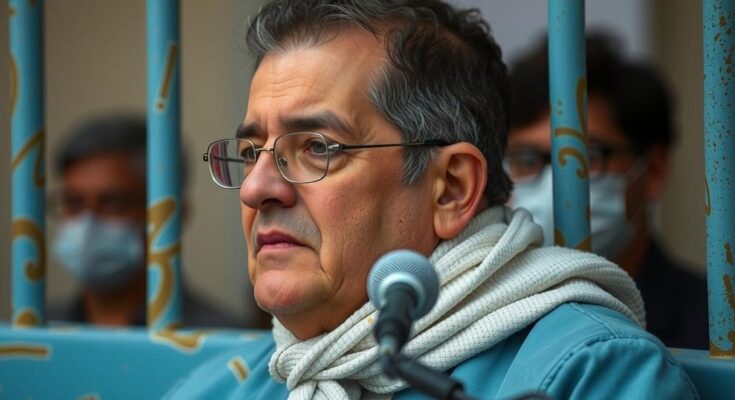Said Ait Mahdi, a prominent Moroccan activist, was sentenced to three months in prison for leading protests against the government’s earthquake response. Charged with defamation, assault, and inciting unauthorized demonstrations, his case has attracted significant criticism from human rights advocates who view the conviction as politically motivated. The September 2023 earthquake had a devastating impact, bringing attention to governmental shortcomings in recovery efforts.
A prominent Moroccan activist, Said Ait Mahdi, who played a leading role in protests against the government’s response to a devastating earthquake, was sentenced to three months in prison along with a financial penalty exceeding $1,000. Ait Mahdi, age 32 and president of a leading activist organization in the quake-affected area, faced charges including defamation, assault, and inciting an unauthorized demonstration. This decision has drawn condemnation from human rights advocates, who argue that it is politically motivated and an infringement on civil liberties.
The earthquake, which struck the Al Haouz region in September 2023 with a magnitude of 6.8, resulted in nearly 3,000 fatalities and enormous destruction, adversely impacting homes, schools, and health facilities. Many survivors remain displaced in temporary shelters and have voiced criticism towards local officials regarding the inadequate recovery efforts. Protests have sporadically occurred in various towns, emphasizing public dissatisfaction with the government’s handling of the disaster response.
According to Ait Mahdi’s attorney, the sentence he received was unexpectedly lenient compared to the typical one-year term for similar offenses. While Ait Mahdi was sentenced, three other activists facing comparable charges were acquitted, demonstrating the contentious nature of this legal situation.
Civil rights organizations in Morocco have condemned Ait Mahdi’s arrest as arbitrary and retaliatory against his activism aimed at aiding earthquake victims. The Moroccan Association for Human Rights criticized the legal action as politically motivated, alleging it was undertaken to suppress advocacy for the rights of those affected.
Additionally, the earthquake has highlighted long-standing disparities between the mountainous regions and Morocco’s urban centers. The government has committed over $11.5 billion towards recovery efforts, seeking to rebuild infrastructure and support displaced families. Activist organizations have continued to rally publicly, including a significant demonstration held in Rabat to urge quicker reconstruction processes, expressing the urgent need for greater government accountability and aid.
In September 2023, Morocco experienced a tragic 6.8-magnitude earthquake that caused immense devastation in the Al Haouz region, resulting in almost 3,000 deaths and widespread structural damage. The disaster’s aftermath has prompted public outcry regarding the government’s response and recovery efforts, particularly as many survivors remain in temporary shelters. Activist groups have emerged, advocating for the rights and needs of the earthquake victims, contributing to an atmosphere where civil liberties and government accountability are major concerns.
The sentencing of Said Ait Mahdi underscores the fraught relationship between the Moroccan government and civil rights activists, particularly in the aftermath of the earthquake. His case is emblematic of broader issues regarding human rights and governmental responsiveness in disaster recovery. As protests continue and advocacy intensifies, both the local and international communities are watching closely to see how the Moroccan government will address the needs of its citizens and the legitimate demands for accountability and justice.
Original Source: www.independent.co.uk




